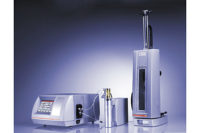Testing Made Easy
Testing Made Easy
Lab equipment for beverage manufacturing
Throughout the
development and production process, beverages undergo comprehensive testing
of both formulation and packaging. Technology and testing options are
making this process easier for beverage manufacturers. Beverage Industry’s Lab Testing
Equipment Showcase features companies offering equipment for the beverage
laboratory, including instruments for quality control, carbonation testing,
refractometers, chemical analysis equipment, equipment for water testing
and plant trial equipment.
Beverage testing
Sanitation is a key issue for beverage plants, and
LaMotte Co., Chestertown, Md., offers test strips, kits, photometers and
turbidity meters to meet beverage testing needs. Equipment from vats to
lines to containers all must be sanitized before and after use. The usual
sanitizers are chlorine, iodine and QAC, but other products such as
chlorine dioxide and peracetic acid also are being used. CIP units usually
use caustic solutions. Since the concentrations are high, test strips
and/or field kits are required to monitor these sanitizers and cleaners.
Many plants also reprocess potable water using
chlorine and flocculation to improve the water quality. Here, it is vital
to dechlorinate since chlorine can affect product flavor. To eliminate this
problem, reverse osmosis and ozone are usually used in bottled water.
LaMotte’s photometers can be used to measure chlorine and ozone
concentrations.
Additionally, turbidity can be a problem in any type
of beverage. As beers and white wines age, proteins can contribute to
turbidity. Nephelometers are turbidity meters that read light scatter at a
90 degree angle to the source beam. One LaMotte version uses a white light
source, while a second uses infrared (IR). The IR version is best for
colored solutions, and these meters are sometimes called Haze meters.
Nephelometers usually report results as Nephelometric Turbidity Units (NTU)
or Formazin Nephelometeric Units (FNU).
Microbiology equipment
Sartorius Stedim Biotech,
headquartered in Germany with offices in Edgewood, N.Y., provides a
complete line of laboratory products for the beverage industry, including
filtration, microbiology and water purification equipment.
During the past few years, several methods for quick
detection of microorganisms have been introduced to the market. What they
all have in common is that they can only be used if the bioburden, the
number of microorganisms on a product prior to sterilization, is relatively
high (i.e. 103–104/ml.). In the beverage industry, however, it is
important that trace contamination, sometimes consisting of only a few
microorganisms, can be detected per milliliter or per bottled unit. For
such applications, good methods are ones that concentrate on low-microbial
counts using relatively large volumes, Sartorius says. The quickest method
of concentration consists of filtration through a membrane. The filter is
then incubated on a specific culture medium, thereby causing the relevant
microorganisms to form visible colonies that can be counted, the company
explains.
Sartorius offers a complete line of microbiology,
filtration and water purification products for quality control needs. For
microbiological analysis in the beverage industry, Sartorius offers a broad
range of Biosart 100 Monitors, Nutrient Pad Sets, filter membranes,
funnels, stainless steel manifolds, vacuum pumps, absorbent pads, filter
paper, Petri dishes and nutrient media.
Refractometers
An important need in the beverage industry is to
closely measure and control the sugar and sweetener (Brix) content.
Maintaining proper concentration ensures quality and reduces costs.
Reichert Analytical Instruments, Depew, N.Y., offers a range of
refractometers suited for these measurements, from raw materials to
production and then to final product.
Another area of interest in quality control is to
ensure that products are safe for the consumer. Reichert offers Colony
Counters to measure for bacterial presence in acidic beverages, such as
fruit juices. The Darkfield Quebec Colony Counters count bacteria colonies
and can be used for microbiology work in the laboratory.
Reichert offers measurement tools such as modern
laboratory refractometers and go-anywhere hand-helds. The Reichert AR7 and
AR6 series automatic benchtop refractometers offer options of Peltier
Temperature Control and measurement resolution out to 1/100 percent Brix.
For those who require a laboratory refractometer but are limited in budget,
the company offers the r2i300 Compact Benchtop Refractometer. Some in the
beverage industry prefer the method of viewing a shadowline using the
traditional Abbe style refractometer. The Arias 500 refractometer is a
semi-automatic transmission style Abbe, offering the best features of both
a manual and automatic refractometer. It allows users to visualize the
shadowline within a large field of view, and automatically determines the
crosshair intersection.
On the production floor, it is common to find portable
refractometers that allow plant personnel to conduct tests while the
beverage is processed, or areas such as receiving, where Brix and
concentration measurements must be made. Reichert also offers the Goldberg
series Brix hand-held refractometer. Using a proprietary liquid-filled
prism for automatic temperature compensation, this Brix refractometer is
accurate to 0.1 percent. And for a rugged, hand-held refractometer,
Reichert offers the Rhino series Brix hand-helds. These Rhino
refractometers are IP67 rated for water resistance and are dustproof.
CO2 tests
Zahm & Nagel, Buffalo, N.Y., offers equipment for
use in breweries and bottling plants. Its testing instruments are used
primarily to test air and CO2 content in cans and bottles of carbonated
beverages, CO2 in brewing tanks, as well as the purity of CO2 gas sources.
Major American breweries and soft drink plants find these instruments
indispensable to ensure the production of a quality product.
Zahm and Nagel Co. also sells carbonating stones and
related carbonating equipment. Its standard 2 inch by 10 inch ceramic
carbonating stone can produce finely carbonated
beer. Recently, the company has begun producing a smaller diameter
stainless steel stone, which is used by many microbreweries to achieve the
same results but in smaller vessels.
Miniature plant trials
MicroThermics’ technical staff are experts in
scaling up and down UHT, aseptic, pasteurization and continuous cooking
processes. The Raleigh, N.C.-based company’s laboratory,
mini-production and pilot processors simulate the whole process, not just
the hold tube. The technology behind the equipment enables researchers to
get production quality results for beverages, including milk, shakes, soy
milk and juices right in their lab or pilot plant. MicroThermics offers
expert training, preventative maintenance programs, same-day shipment for
most parts, and extensive miniature plant trial services.
MicroThermics also provides equipment that uses PLC
touchscreen with on-board operational guides and extensive data logging.
The company’s processors can use direct steam injection, tubular heat
exchangers, plate heat exchangers and even microwave heating systems.
MicroThermics also utilize equipment including vacuum cooling, deaerators,
in-line homogenizers and ultra-clean fillers.
Looking for a reprint of this article?
From high-res PDFs to custom plaques, order your copy today!





